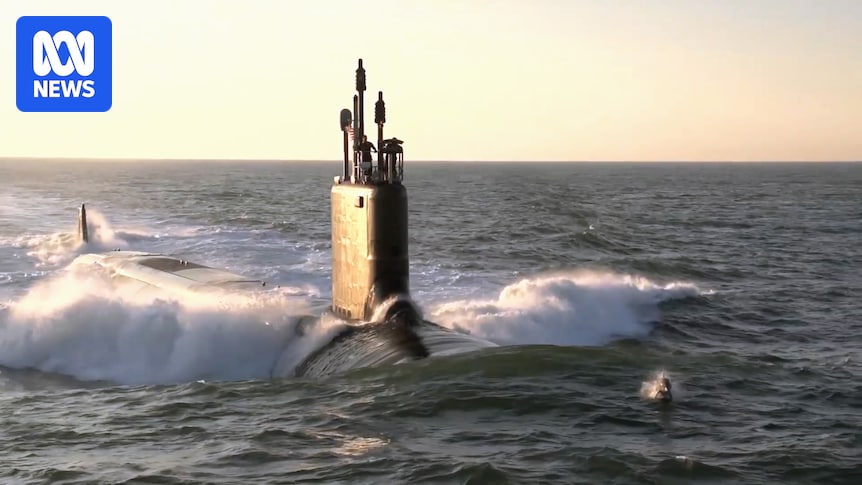
A former senior Pentagon official has called on Australia to provide the United States with more “concrete” commitments regarding the deployment of Virginia-class nuclear-powered submarines in the event of war. This comes as Australian Defence Minister Richard Marles arrives in Washington, D.C., for high-level meetings with the Trump Administration.
Abraham Denmark, who served as the senior AUKUS advisor to former US Defense Secretary Lloyd Austin, has co-authored a new report on the defense technology pact with Charles Edel, the Australia Chair for the US think tank, the Centre for Strategic and International Studies (CSIS). The report emphasizes that AUKUS is a “strategic imperative” for the US, Australia, and the United Kingdom, and is currently at a “critical juncture,” urging all three nations to intensify their efforts to ensure its success.
Strategic Imperatives and Diplomatic Concerns
The authors of the CSIS report support the Trump administration’s review of the defense pact but caution against abandoning AUKUS. They argue that such a move would weaken the US’s capabilities in the region, diminish its defense posture and diplomatic presence, and undermine its international credibility. This, they warn, would bolster propaganda from Beijing and Moscow, which questions the reliability of American commitments.
“Abandoning AUKUS would make the US ‘less capable’ in the region, warning its ‘defense posture and diplomatic presence would become less deeply embedded, its international credibility would be dramatically undercut (and) deterrence would be undermined,'” the report states.
The supply of Virginia-class submarines has been a contentious issue between Australia and the US. The Albanese government has expressed unease about the Trump administration’s attempts to link AUKUS to defense funding and has resisted US demands for pre-committing these submarines to any American war efforts in the region.
Balancing Sovereignty and Strategic Planning
The CSIS report suggests a middle ground on this sensitive issue, asserting that while Australia has every right to protect its sovereignty, both countries should engage in robust and detailed “contingency planning” to determine how Australian nuclear-powered submarines might be deployed in a conflict. This planning would involve military strategists from both nations working together to strategize and organize military operations to achieve specific objectives.
“Planning… would provide US officials with more concrete reassurances that submarines sold to Australia would not disappear if and when needed,” the report explains. “It could also preserve Australian sovereignty in developing the plan and, if necessary, in determining implementation during a crisis.”
The report’s release coincides with Mr. Marles’ scheduled meetings with US Secretary of Defense Pete Hegseth and other senior administration officials in Washington, D.C. The ABC reports that Mr. Marles might also meet with US Vice President JD Vance, although this meeting is not yet confirmed.
Expanding Military Footprint and Future Implications
With the US expanding its military presence in Australia, particularly with a focus on Beijing, the CSIS report highlights how AUKUS can enhance Washington’s submarine presence and maintenance capabilities from the HMAS Stirling naval base in Perth.
“From this location, US, UK, and eventually Australian submarines will be able to reach critical areas of potential crisis and conflict undetected, creating a far more complex and challenging operational environment for Beijing,” the report notes.
The federal government has also emphasized Australia’s capacity to assist in maintaining American nuclear-powered submarines at HMAS Stirling. However, the report warns that significant investment in Stirling as a major maintenance facility is unlikely unless the US commits to selling three to five Virginia-class submarines to Australia under the AUKUS “optimal pathway.”
“Senior Australian officials have privately stated that without such a signal, Australia is likely to prioritize its defense dollars elsewhere,” the report warns.
Broader Military Technology Collaboration
Edel and Denmark also express concerns that efforts by Australia, the US, and the UK to develop other high-end military technologies under pillar II of AUKUS remain “too broad and unfocused.” They recommend that all three countries concentrate on three capability areas: autonomy, long-range strike, and integrated air defense.
Additionally, the report suggests several other recommendations for AUKUS, including the creation of a streamlined visa to facilitate the movement of researchers and industry professionals between the three countries for collaborative AUKUS-related projects. It also proposes the appointment of a special representative for AUKUS to drive efforts and ensure the success of the pact, reporting directly to Prime Minister Anthony Albanese and President Donald Trump.
As discussions continue in Washington, the future of AUKUS and its implications for regional security remain a focal point for all involved parties. The outcomes of these meetings could significantly influence the strategic landscape in the Indo-Pacific region.







